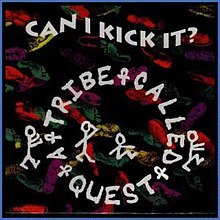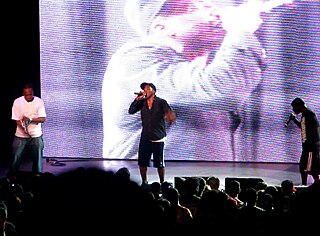
A Tribe Called Quest was an American hip hop group formed in Queens, New York City, in 1985, originally composed of rapper and main producer Q-Tip, rapper Phife Dawg, DJ and co-producer Ali Shaheed Muhammad, and rapper Jarobi White. The group is regarded as a pioneer of alternative hip hop and merging jazz with hip hop, influencing numerous hip hop and R&B musicians.
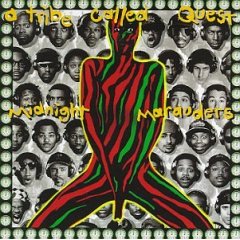
Midnight Marauders is the third studio album by American hip hop group A Tribe Called Quest, released on November 9, 1993, by Jive Records. Recording sessions for the album occurred at Battery Studios, Platinum Island Studios and Scorcerer Sound in New York City. Its production was mainly handled by Q-Tip, with contributions from Skeff Anselm, Large Professor and the group's DJ, Ali Shaheed Muhammad. A culmination of the group's two previous albums, People's Instinctive Travels and the Paths of Rhythm and The Low End Theory, it features an eclectic, gritty sound based on jazz, funk, soul and R&B samples, in addition to socially conscious, positively-minded, and humorous lyrics.
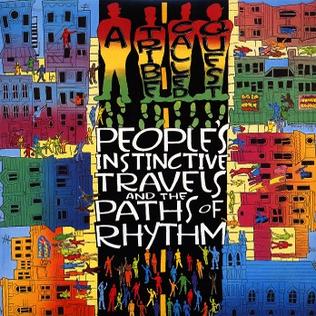
People's Instinctive Travels and the Paths of Rhythm is the debut studio album by American hip hop group A Tribe Called Quest, released on April 10, 1990 on Jive Records. After forming the Native Tongues collective and collaborating on several projects, A Tribe Called Quest began recording sessions for People's Instinctive Travels in late 1989 at Calliope Studios with completion reached in early 1990. The album's laid back production encompassed a diverse range of samples which functioned as a template for the group's unorthodox lyrics.

Kamaal Ibn John Fareed, better known by his stage name Q-Tip, is an American rapper, record producer, singer, and DJ. Nicknamed the Abstract, he is noted for his innovative jazz-influenced style of hip hop production and his philosophical, esoteric and introspective lyrical themes. He embarked on his music career in the late 1980s, as an MC and main producer of the influential alternative hip hop group A Tribe Called Quest. In the mid-1990s, he co-founded the production team The Ummah, followed by the release of his gold-certified solo debut Amplified in 1999. In the following decade, he released the Grammy Award-nominated album The Renaissance (2008) and the experimental album Kamaal the Abstract (2009).

Transformer is the second solo studio album by American recording artist Lou Reed. Produced by David Bowie and Mick Ronson, the album was released on November 8, 1972 by RCA Records. It is considered an influential landmark of the glam rock genre, anchored by Reed's most successful single, "Walk on the Wild Side", which touched on controversial topics of sexual orientation, gender identity, prostitution and drug use. Although Reed's self-titled debut solo album had been unsuccessful, Bowie had been an early fan of Reed's former band The Velvet Underground and used his fame to promote Reed, who had not yet achieved mainstream success.
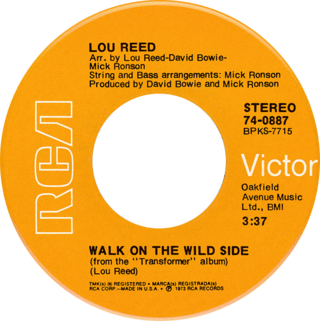
"Walk on the Wild Side" is a song by American rock musician Lou Reed from his second solo studio album, Transformer (1972). It was produced by David Bowie and Mick Ronson and released as a double A-side with "Perfect Day". Known as a counterculture anthem, the song received wide radio coverage and became Reed's biggest hit and signature song while touching on topics considered taboo at the time, such as transgender people, drugs, male prostitution, and oral sex.

Fu-Schnickens were an American hip-hop trio from 1988 to 1995, based in Brooklyn, New York.
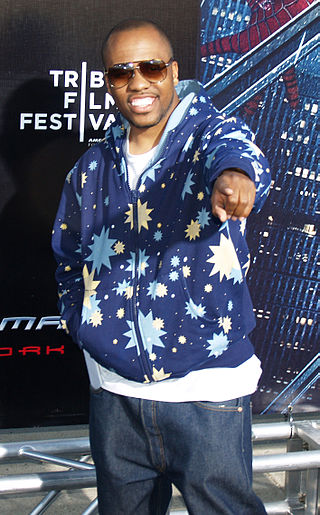
Dexter Raymond Mills Jr., better known by his stage name Consequence, is an American rapper from New York City. He is best known for his collaborative work with A Tribe Called Quest and Kanye West. He later squashed his feud with rapper Pusha T in 2016.

"Electric Relaxation" is the second single from American hip hop group A Tribe Called Quest's third album, Midnight Marauders (1993). It contains a sample of the song "Mystic Brew" by jazz organist Ronnie Foster.
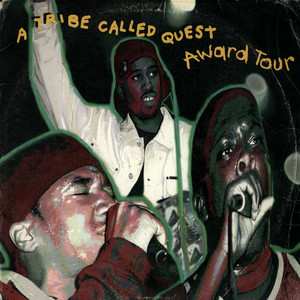
"Award Tour" is a song by American hip hop group A Tribe Called Quest, released in October 1993 by Jive Records as the first single from their third album, Midnight Marauders (1993). The song features rapper Trugoy on the chorus, from the fellow Native Tongues group De La Soul. It contains a sample of "We Gettin' Down" by Weldon Irvine, from his 1975 album Spirit Man. The B-side of the single is the original version of the Midnight Marauders track "The Chase, Pt. 2", which notably features the first known verse by future Tribe collaborator Consequence. "Award Tour" remains Tribe's highest charting single to date on the US Billboard Hot 100, peaking at number 47. It also peaked at number 54 on the Cash Box Top 100 as well as topping the Billboard Dance Singles chart.

"Jazz (We've Got)" is the second single from A Tribe Called Quest's second album The Low End Theory. The original material sampled in the song was provided by Pete Rock, and was then recreated in a similar way by Q-Tip. Although Pete Rock is not officially credited, Q-Tip credits him in the outro of the track, rapping "Pete Rock for the beat, ya don't stop."
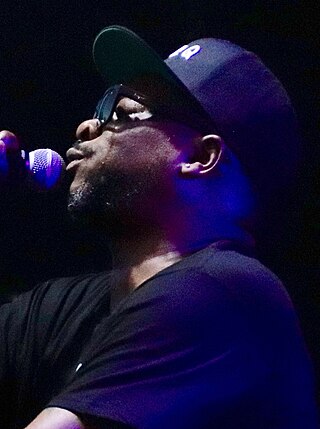
Jarobi White is an American hip hop artist, chef, and a founding member of alternative hip hop group A Tribe Called Quest, alongside members Q-Tip, Phife Dawg, and Ali Shaheed Muhammad. He left the group after the release of their debut album, People's Instinctive Travels and the Paths of Rhythm in order to pursue culinary arts, before returning for their last album, 2016's We Got It from Here... Thank You 4 Your Service. In the early 2010s, Jarobi formed evitaN with Dres, formerly of Black Sheep. Their first album, Speed of Life, was released in October 2012.
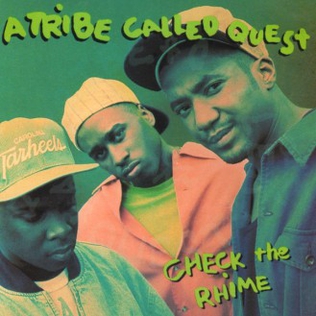
"Check the Rhime" is the first single from A Tribe Called Quest's second album The Low End Theory. The song was written by group members Phife Dawg, Q-Tip, and Ali Shaheed Muhammad. It was recorded at the legendary Greene St. Recording studio in New York City. The song peaked at number 59 on Billboard on November 16, 1991. Rolling Stone listed "Check the Rhime" as one of the group's 20 essential songs, noting that Phife Dawg "quickly proves himself Q-Tip's lyrical equal."

"Scenario" is the third single from A Tribe Called Quest's second album The Low End Theory. The song features the rap group Leaders of the New School. Matt Cibula of PopMatters called the track hip-hop's greatest posse cut. The song is commonly considered a breakout moment for Leaders of the New School member Busta Rhymes, who was 19 when this song was released. Time included the song on its list of its All-TIME 100 Songs in 2017.

"Get It Together" is a song by American hip-hop group the Beastie Boys, released as the second single from their fourth studio album, Ill Communication. The album version of the song features rapper Q-Tip of A Tribe Called Quest, but not the single version.

"Wildside" is a song by American hip-hop group Marky Mark and the Funky Bunch. It was released in October 1991 as the second single from their 1991 album Music for the People. It heavily samples Lou Reed's 1972 "Walk on the Wild Side". All vocals on the track are performed by the group's leader Mark Wahlberg.

"We the People...." is a song by American hip hop group A Tribe Called Quest, and the first single from their sixth and final album, We Got It from Here... Thank You 4 Your Service. Produced by Q-Tip and co-produced by Blair Wells, the song contains a sample of the drum break of "Behind the Wall of Sleep" by Black Sabbath. The name of the track refers to the first three words of the Preamble to the United States Constitution. The chorus of the politically-charged song parodies Donald Trump's presidential campaign. "We the People...." was critically acclaimed and included on several year-end lists by publications.

Supermarket is a soundtrack album by American rapper Logic. It was released on March 26, 2019, by Def Jam Recordings and Visionary Music Group. The soundtrack serves as a tie-in for the novel of the same name. The soundtrack was released to negative reviews by music critics, and it peaked at number 56 on the Billboard 200.

"Summer Girl" is a song by American band Haim, released as a single on July 31, 2019. It premiered as Annie Mac's "Hottest Record" on BBC Radio 1. The song musically references "Walk on the Wild Side" by Lou Reed, who is credited as a songwriter.
"The Space Program" is a song by American hip hop group A Tribe Called Quest, from their sixth and final album, We Got It from Here... Thank You 4 Your Service. Produced by Q-Tip and co-produced by Blair Wells, it is the opening track on the album, and includes posthumous vocals by group member Phife Dawg, who recorded the song with the group before his death in March 2016. Praised as the "triumphant return of the Tribe", it is a political hip hop song that addresses gentrification and racism in the United States.
